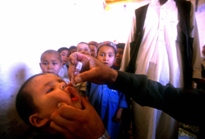 A young boy receives a polio vaccine during a national immunization day in Pakistan5 August 2012 – Poliovirus has been found in sewage water samples collected from Gaddap town in Karachi. Samples have previously been clear for about 4 months. Gaddap town is one of the poliovirus reservoirs in the country.
A young boy receives a polio vaccine during a national immunization day in Pakistan5 August 2012 – Poliovirus has been found in sewage water samples collected from Gaddap town in Karachi. Samples have previously been clear for about 4 months. Gaddap town is one of the poliovirus reservoirs in the country.
Substantial efforts have been made over the last 6 months to reach every child during each polio campaign. However, during the last campaign which took place in mid July, not all children were reached due to the deteriorating security situation and incidents targeting polio workers.
Sewage samples from Baldia town in Karachi also showed the presence of poliovirus for the first time this year after 12 previous samples from earlier in the year were clear. Sewage samples from Sukkur and Hyderabad in Sindh, Peshawar in Khyber Pakhtunkhwa and Rawalpindi and Lahore in Punjab have also shown the presence of poliovirus.
Pakistan has reported a total of 27 polio cases this year so far; 13 from Federally Administered Tribal Areas, 6 from Khyber Pakhtunkhwa, 3 each from Sindh and Punjab and 2 from Balochistan. These polio cases were identified from 15 districts in the country. Pakistan’s augmented national emergency action plan aims at interrupting poliovirus circulation in the country by the end of 2012.
These recent cases are the result of the ban on the conducting of polio campaigns by agencies in north and south Waziristan. This ban has meant that more than 200 000 children in these areas have not received the polio vaccine. This is in addition to Bara tehsil, which has been inaccessible for vaccination teams since September 2009. It is significant that 10 of the 13 polio cases in Federally Administered Tribal Areas this year have been reported from Bara. Without a reversal on the recently imposed ban on polio vaccination and improved access to Bara the goal of the national emergency action plan will be seriously jeopardized.




